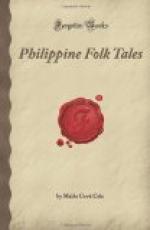Now the two brothers of the rivals felt the earth tremble although they were far away, and each feared that his brother was in trouble. One was in the mountains and he started at once for the sea; the other was in a far land, but he set out in a boat for the scene of the trouble.
They arrived at the same time at the place of battle, and they immediately joined in it. Then the trembling of the earth increased so much that Langgona, the father of Aguio and Bulanawan, sought out the spot and tried to make peace. But he only seemed to make matters worse, and they all began fighting him. So great did the disturbance become that the earth was in danger of falling to pieces.
Then it was that the father of Langgona came and settled the trouble, and when all were at peace again they discovered that Aguio and Bulanawan were brothers and the grandsons of the peacemaker.
Origin
Bagobo (Mindanao)
In the beginning there lived one man and one woman, Toglai and Toglibon. Their first children were a boy and a girl. When they were old enough, the boy and the girl went far away across the waters seeking a good place to live in. Nothing more was heard of them until their children, the Spaniards and Americans, came back. After the first boy and girl left, other children were born to the couple, but they all remained at Cibolan on Mt. Apo with their parents, until Toglai and Toglibon died and became spirits.
Soon after that there came a great drought which lasted for three years. All the waters dried up, so that there were no rivers, and no plants could live.
“Surely,” said the people, “Manama is punishing us and we must go elsewhere to find food and a place to dwell in.”
So they started out. Two went in the direction of the sunset, carrying with them stones from Cibolan River. After a long journey they reached a place where were broad fields of cogon grass and an abundance of water, and there they made their home. Their children still live in that place and are called Magindanau, because of the stones which the couple carried when they left Cibolan.
Two children of Toglai and Toglibon went to the south, seeking a home, and they carried with them women’s baskets (baraan). When they found a good spot, they settled down. Their descendants, still dwelling at that place, are called Baraan or Bilaan, because of the women’s baskets.
So two by two the children of the first couple left the land of their birth. In the place where each settled a new people developed, and thus it came about that all the tribes in the world received their names from things that the people carried out of Cibolan, or from the places where they settled.
All the children left Mt. Apo save two (a boy and a girl), whom hunger and thirst had made too weak to travel. One day when they were about to die the boy crawled out to the field to see if there was one living thing, and to his surprise he found a stalk of sugar-cane growing lustily. He eagerly cut it, and enough water came out to refresh him and his sister until the rains came. Because of this, their children are called Bagobo. [124]




